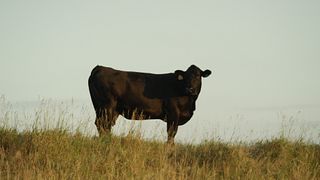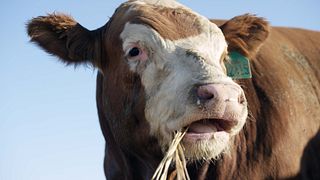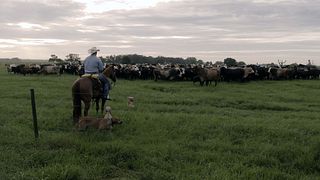Growth Promoting Hormone Usage in Cattle Ranching
Hormones are naturally occurring compounds in different animals and organisms that promote healthy growth. For cattle, their natural hormones stimulate the pituitary gland and help cattle enhance their muscle-building ability while also decreasing the amount of fat deposited in and around muscles. Supplemental hormones are sometimes used to raise beef more efficiently with fewer resources.
- Hormones help promote healthy growth and are found naturally in plants, animals, humans, and the environment.
- Hormones and hormone-like compounds are found in different types of food including beef (1.3 – 1.9 nanograms of estrogen per 3oz. serving of steak), eggs (993 nanograms of estrogen), potatoes, (300 nanograms for ½ cup) and peas (542 nanograms of estrogen for ½ cup).4
- If supplemental hormones are given, it can be either as a feed ingredient as part of a healthy, balanced diet or via a hormone implant that is smaller than a pea.
- This management decision is part of a comprehensive program developed in consultation with animal health professionals and other experts to ensure optimal animal health and well-being.
- These implants are placed under the skin behind the ear and stimulate the gland that produces natural hormones in the animal’s body.
food safety and hormones
All hormones used in beef production must be approved by the U.S. Food and Drug Administration (FDA). It starts with a comprehensive, multi-step scientific review process. If a product fails even one test or step in the process, it will not be approved.
The FDA and the United States Department of Agriculture (USDA) oversee the safety of food products. The FDA sets a tolerance on hormone residue levels that can be found in food. The USDA conducts random sampling of beef to check for residues.
Extensive research shows that supplemental hormones are metabolized quickly and clear an animal’s system before entering the food supply. Furthermore, decades of research have looked at the effect of using hormones in livestock production, but none have found any human health impact.3
Why use supplemental hormones?
Using supplemental growth promoting hormones helps the beef community raise beef with fewer natural resources like land and water. Studies have shown that if farmers and ranchers could no longer use supplemental hormones, it would require 141 billion gallons more water (equivalent to supplying 1.3 million U.S. households annually)1 to raise the same amount of beef.
Increasing the efficiency of beef production will become even more important as we seek to feed a growing population and as we strive to continue to reduce environmental impact.
Supplemental hormones can play an important role in increasing the efficiency of beef production through increasing conversion of the feed cattle eat into beef.2 They help reduce environmental impact by decreasing the number of cattle required to produce a given amount of beef. Studies have shown that using supplemental hormones does not have any impact on human health.3 Farmers and ranchers do everything in their power to ensure the food they produce to feed your families and their families are safe.
- Capper, J.L. and D.J. Hayes. 2012. The environmental and economic impact of removing growth-enhancing technologies from U.S. beef production. J. Anim. Sci. 90:3527-3537.
- Cooprider, K.L., F.M. Mitloehner, T.R. Famula, E. Kebreab, Y. Zhao, and A.L. Van Eenennaam. 2011. Feedlot efficiency implications on greenhouse gas emissions and sustainability. J. Anim. Sci. 89:2643-2656.
- Stewart, L. 2013. Implanting beef cattle. Univ. of Georgia. Bulletin 1302.
- Tabler, T., Wells, J. and Zhai, W. 2013. Chickens do not receive growth hormones: so why all the confusion? Mississippi State Univ. Extension Serv. http://extension.msstate.edu/sites/default/files/publications/publications/p2767.pdf







